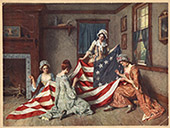Libraries, University of Nebraska-Lincoln
Document Type
Archival Material
Date of this Version
1845
Abstract
Furman’s Address includes discussions of pre-Columbian agriculture, the Norse discovery and settlement of North America, the state of New York as it appeared to its first settlers, the manifest destiny of the United States, the early societies to promote agriculture and scientific invention, the promotion of the potato, the growth of population in America, the developments of water and steam power, the prevalence of sugar, the progress of astronomy and geology, cosmological reasons for historical climate change, the discoveries of tropical fossils in the northern latitudes, the growth of wheat from ancient Egyptian seeds, and the role of the educated citizen-farmer:
“The farmer is truly the lord of the soil, and his position in society the most independent of all its members. The leisure which winter affords from the labours of agriculture gives him an opportunity for storing his mind with useful knowledge, which few, very few, in the active pursuits of life can ever hope to gain. There is every opportunity for him in this country to take the lead in all the affairs of the nation if he chooses so to do.”
Furman, a historian, antiquarian, and book collector (as well as a lawyer, judge, and politician), takes the opportunity to mention Adriaen Vanderdonck, Daniel Denton, Hendrick Hudson, Samuel Miller, Charles Apthorp, William Smith, Walter Rutherford, John Morin Scott, James Duane, John Vanderspiegel, Thomas Young, Joshua Clark, Francis Furnier, Robert Livingstone, Ezra L’Hommedieu, Samuel Hartliff (Hartlib), Antoine-Augustin Parmentier, Hugh Miller, John Aiken, Louis Agassiz, John Pringle Nichol, William Long, and Samuel Mitchell.
Printed at the Office of "The Long Island Farmer," by C. S. Watrous, Jamaica, New York, 1845, 22 pages (blanks omitted).



Comments
Deposited by Paul Royster (proyster@unl.edu), November 25, 2008.